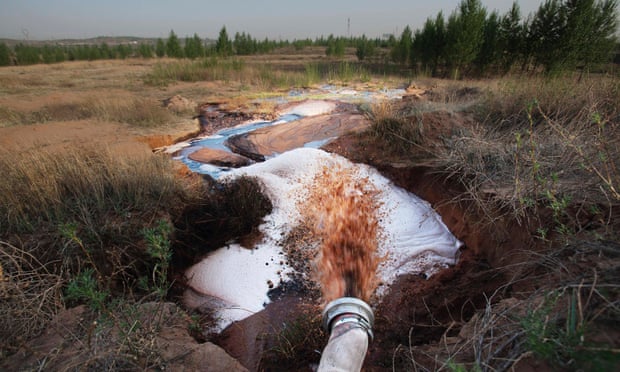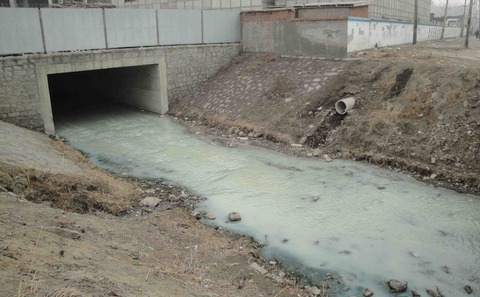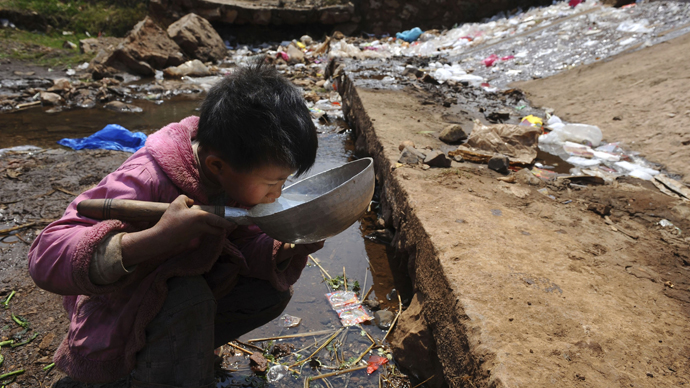China Says That One Half of its
Groundwater is Polluted




Nearly 60% of China’s underground water is polluted, state media has reported, underscoring the severity of the country’s environmental woes.
The country’s land and resources ministry found that among 4,778 testing spots in 203 cities, 44% had “relatively poor” underground water quality; the groundwater in another 15.7% tested as “very poor”.
Water quality improved year-on-year at 647 spots, and worsened in 754 spots, the ministry said.
“According to China's underground water standards, water of relatively poor quality can only be used for drinking after proper treatment. Water of very poor quality cannot be used as source of drinking water,” said an article in the official newswire Xinhua, which reported the figures on Tuesday.
The Chinese government is only now beginning to address the noxious environmental effects of its long-held growth-at-all-costs development model. While authorities have become more transparent about air quality data within the past year, information about water and soil pollution in many places remains relatively well-guarded.
Xinhua reported last year that about one-third of China’s water resources are groundwater-based, and that only 3% of the country’s urban groundwater can be classified as “clean”. A land ministry report from last year said that 70% of groundwater in the north China plain - a 400,000 sq km swath of some of the world’s most densely-populated
land - is unfit for human touch.
“The situation is quite serious -- groundwater is important source for water use, including drinking water, and if it gets contaminated, it’s very costly and difficult to clean,” said Ma Jun, director of the Beijing-based Institute of Public and Environmental Affairs.
“But still I consider this disclosure a positive move - greater
awareness can help people prevent exposure to health risks, and eventually, motivate society to try and tackle this serious problem.”
Few Chinese urban dwellers consider tap water safe to drink - most either boil their water or buy it bottled. Earlier this month, a chemical spill poisoned the water supply of Lanzhou - a city of 2 million people in China’s north-west - with the carcinogen benzene, causing a panicked run on bottled drinks.
Last week, China’s land ministry released some statistics from a nationwide soil survey, which was previously classified as a state secret. The ministry found that 16% of sites tested over a nine-year period were polluted, some with cadmium, mercury and arsenic. China’s “overall national soil environment” is “not optimistic,” the report
concluded.
While Beijing’s noxious smog has become internationally infamous, drought and water pollution may pose even greater existential threats to the city. Beijing’s annual per capita water availability is about 120 cubic metres, about one-fifth of the UN’s cut-off line for "absolute scarcity".
“According to China's underground water standards, water of relatively poor quality can only be used for drinking after proper treatment. Water of very poor quality cannot be used as source of drinking water,” said an article in the official newswire Xinhua, which reported the figures on Tuesday.
The Chinese government is only now beginning to address the noxious environmental effects of its long-held growth-at-all-costs development model. While authorities have become more transparent about air quality data within the past year, information about water and soil pollution in many places remains relatively well-guarded.
Xinhua reported last year that about one-third of China’s water resources are groundwater-based, and that only 3% of the country’s urban groundwater can be classified as “clean”. A land ministry report from last year said that 70% of groundwater in the north China plain - a 400,000 sq km swath of some of the world’s most densely-populated
land - is unfit for human touch.
“The situation is quite serious -- groundwater is important source for water use, including drinking water, and if it gets contaminated, it’s very costly and difficult to clean,” said Ma Jun, director of the Beijing-based Institute of Public and Environmental Affairs.
“But still I consider this disclosure a positive move - greater
awareness can help people prevent exposure to health risks, and eventually, motivate society to try and tackle this serious problem.”
Few Chinese urban dwellers consider tap water safe to drink - most either boil their water or buy it bottled. Earlier this month, a chemical spill poisoned the water supply of Lanzhou - a city of 2 million people in China’s north-west - with the carcinogen benzene, causing a panicked run on bottled drinks.
Last week, China’s land ministry released some statistics from a nationwide soil survey, which was previously classified as a state secret. The ministry found that 16% of sites tested over a nine-year period were polluted, some with cadmium, mercury and arsenic. China’s “overall national soil environment” is “not optimistic,” the report
concluded.
While Beijing’s noxious smog has become internationally infamous, drought and water pollution may pose even greater existential threats to the city. Beijing’s annual per capita water availability is about 120 cubic metres, about one-fifth of the UN’s cut-off line for "absolute scarcity".
Last week, state media reported plans for a seaside desalinisation plant to provide one-third of Beijing’s tap water by 2019. The state-run Beijing Enterprises Water Group will spend 7bn yuan (£667bn) building the plant in neighbouring Hebei province’s Tangshan city, more
than 200 km from the capital.

than 200 km from the capital.

No comments:
Post a Comment
Comments always welcome!